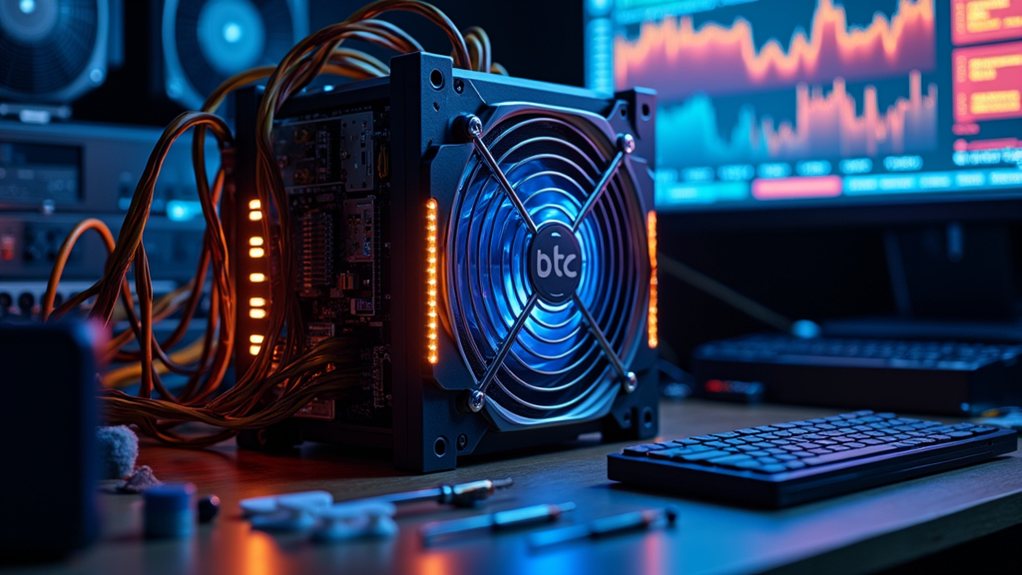Security tokens are digital representations of ownership that live on blockchain technology. They're regulated as securities, but with blockchain's added perks: faster settlements, lower costs, and 24/7 trading potential. These tokens come in various flavors—equity, debt, asset-backed—and must jump through regulatory hoops to exist legally. Despite the buzz, challenges remain: murky regulations, lack of standardization, and public confusion. The road to mainstream adoption isn't exactly a smoothly paved highway.

The financial world changes fast. One minute you're trading stocks the traditional way, the next you're buying digital tokens that represent real-world assets. Security tokens are exactly that—digital representations of ownership built on blockchain technology. They're not just trendy tech; they're revolutionizing how people own and trade assets. And yes, the SEC is watching closely.
These tokens come in various flavors. Equity tokens give you ownership in a company without the fancy paper certificate. Debt tokens represent loans or bonds. Asset-backed tokens? Those are tied to physical stuff like buildings or artwork. Then there's fund tokens for investment shares and revenue share tokens that entitle holders to a cut of company profits. Options galore. Exciting, right?
But don't get too excited. Regulations are everywhere. In the US, the SEC keeps a tight leash on these digital assets. The famous Howey Test determines if your token is actually a security. And if it is? Hello compliance requirements. Different countries have different rules too. It's a regulatory jungle out there.
The benefits are substantial though. Traditionally illiquid assets suddenly become tradable. Can't afford an entire office building? Buy a fraction of it. Transaction costs drop. Settlement happens in minutes instead of days. Security tokens serve as a bridge between traditional finance and DeFi, enabling new investment opportunities in previously inaccessible markets. The blockchain records everything transparently. No more "trust me, bro" in financial transactions. Smart contracts automate compliance and processes. Technology actually making things easier—shocking.
Issuing security tokens follows a process. First, determine what rights the token gives. Confirm legal compliance—can't skip that part, sorry. Create smart contracts to govern how the token behaves. Pick a blockchain platform for issuance. Finally, investors buy tokens through regulated channels. Nothing happens under the table here.
Trading happens on specialized exchanges. KYC and AML regulations still apply—anonymity isn't in the cards. Some tokens have transfer restrictions or mandated holding periods. Unlike traditional markets, many token exchanges operate 24/7. Though liquidity varies wildly depending on the specific token.
Challenges remain. Some jurisdictions can't decide how to regulate these assets. Standardization across platforms is lacking. Integration with existing financial infrastructure needs work. And many people still don't understand what security tokens are or how they function. The potential for disruption is massive, but the path isn't clear yet.
Security tokens represent the collision of traditional finance and blockchain technology. These digital assets provide holders with transparent ownership records maintained immutably on the blockchain. The tokenization of real estate has particularly gained traction, with platforms offering fractional ownership opportunities that were previously inaccessible to average investors. It's not perfect. It's not complete. But it's here, and it's changing things. Fast.
Frequently Asked Questions
How Do Security Tokens Differ From Utility Tokens?
Security tokens represent actual ownership in assets, like digital stocks.
They're regulated and must comply with securities laws. Period.
Utility tokens? Just access passes to services or products.
No ownership rights there.
Security tokens offer financial returns and investor protections.
Utility tokens don't.
The value of security tokens ties directly to asset performance, while utility tokens depend on service demand.
Big difference.
One's an investment, one's a tool.
Can Security Tokens Be Traded on Regular Cryptocurrency Exchanges?
Security tokens can't typically be traded on regular crypto exchanges.
Most major platforms lack proper securities licensing and regulatory compliance. That's the law, folks.
Instead, these tokens require specialized exchanges like tZERO or Securitize Markets that handle securities regulations, KYC requirements, and features like dividend distributions.
Some major exchanges are exploring the space, but regulatory hurdles remain significant.
The infrastructure just isn't there yet.
What Regulations Apply to Security Token Offerings?
Security token offerings face hefty regulatory oversight.
The SEC treats them like traditional securities, requiring registration unless they qualify for exemptions like Reg D, A+, or S.
Federal securities laws apply—the 1933 and 1934 Acts.
Issuers must handle KYC/AML checks and verify accredited investors.
Blue Sky laws at the state level add another layer.
Compliance isn't optional.
The Howey Test determines if an investment counts as a security.
No shortcuts here.
How Are Security Tokens Valued in the Market?
Security tokens are valued through multiple approaches.
Market-based methods examine trading data and compare similar assets.
Income-based valuation looks at potential cash flows, using DCF models and yield considerations.
Utility-based assessment measures ecosystem usefulness and adoption rates.
Regulatory factors heavily influence valuation too—legal classifications impact everything.
Unlike utility tokens, security tokens represent actual financial instruments.
That's why they're typically valued more like traditional securities.
Different, but familiar.
What Are the Risks of Investing in Security Tokens?
Security token investments come packed with risks. Market volatility can wipe out values overnight.
Regulatory uncertainty looms large—what's legal today might not be tomorrow. Smart contract bugs? They're real. Hackers love targeting these assets.
Many issuers lack track records, and fraud happens. Keys get lost, tokens become inaccessible.
Liquidity? Often nonexistent. Not to mention conflicts between token holders and shareholders.
Not exactly a sleep-well-at-night investment.








